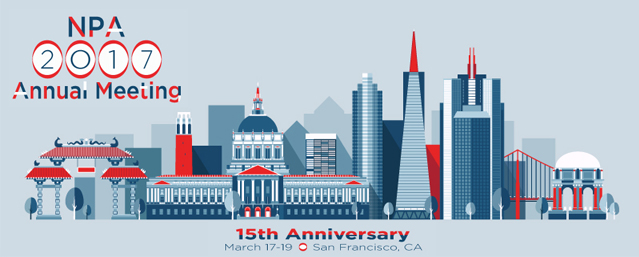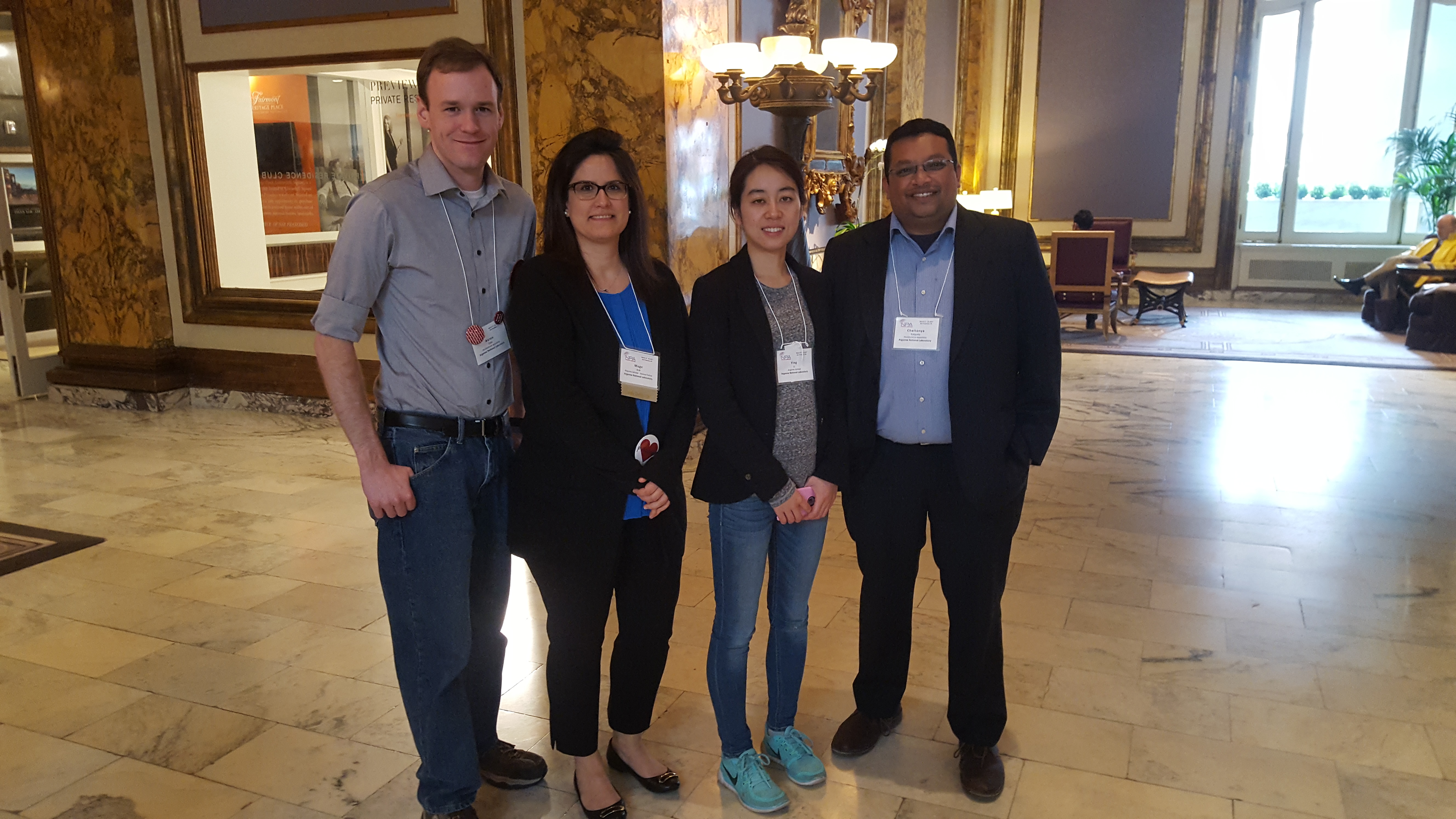 Four Argonne Postdoctoral Researchers and Fellows attended the 2017 NPA Annual Conference, held in San Francisco, March 17-19. The NPA Annual Conference is the largest national conference and networking event dedicated to the postdoctoral community. Conference attendees – postdoctoral scholars, administrators, faculty, and representatives from disciplinary societies, industry, and corporations – are provided with the opportunity to gather and enhance their professional development and leadership skills.
Four Argonne Postdoctoral Researchers and Fellows attended the 2017 NPA Annual Conference, held in San Francisco, March 17-19. The NPA Annual Conference is the largest national conference and networking event dedicated to the postdoctoral community. Conference attendees – postdoctoral scholars, administrators, faculty, and representatives from disciplinary societies, industry, and corporations – are provided with the opportunity to gather and enhance their professional development and leadership skills.
Postdocs and Fellows interested in attending the 2018 NPA Annual Conference need to complete the Interest Survey by January 10th. Questions should be addressed to [email protected].
What benefit do postdocs gain from attending the Annual Meeting? Read on! Attendees were asked why they wanted to attend the conference, what they gained from attending and what was their favorite part. (Some content edited for clarity and length).

Aaron Oaks (NE), Muge Acik (NST), Ying Li (LCF) and CK Kaligotla (GSS) at the 2017 NPA Annual Conference.
Aaron Oaks (NE, 2017 PSA Vice-President)
“I was originally interested in attending the NPA conference to meet postdocs from other institutions, learn what other postdoc societies were doing for their membership, and hear what the NPA leadership would recommend to attendees for career development. The highlights of the trip were probably the plenary talk on career navigation and the talk on exploring organizational culture. The talks themselves were good, but what was most interesting to me was what were essentially data dumps on the topics that I often just hear bits and pieces about. It was nice to have someone collect all the details and just make a digestible list of topics related to postdoc development like useful/transferable skills, personal qualities, and key points of organizational culture to consider when applying for permanent positions. Although it wasn’t really “presented” at the conference, learning that about the NPA Core Competencies list was definitely something I think all postdocs should know. That certainly helps me know which competencies I need to develop.”
Muge Acik (NST, Joseph Katz Named Fellow)
What were your reasons for wanting to go to the NPA conference? “I wanted to enhance my networking skills with a group of postdocs that were not from the same major. It is always easy to get connected with colleagues from the similar work environment, but networking with non-major colleagues may not be as easy as we think. The NPA meeting brought the opportunities to build connections with other women in science (STEM), to improve career connection skills particularly with non-scientists from industry, and to train personal skills for career development. The meeting also helped strengthen the communication skills that we mostly ignore to improve in our routine work life. One of the major focus was available onsite trainings for both academic and industry job applications in a diverse team environment. This meeting also provided networking with the resume builders, faculty members as well as industry affiliated scientists/engineers all over the world from both national and international institutions.”
What was the highlight of the trip for you? “Other than the postdoctoral fellowships at Argonne, there are various fellowship programs with mentorship and training opportunities focusing on specific career majors. For instance, for those who work in the areas of medical or biomedical for clinical research can apply fellowships supported by AACR (American Association for Cancer Research), which also encourage career development awards and grants for independent investigators. For biomedical professionals, the National Research Mentoring Network (NRMN) supported by the NIH offer grant writing programs, and mentorship with national workshops to engage postdocs into competent NIH grant success. The SciPhD certificate program makes academic scientists “business-ready” for professional positions, particularly in academia, government or industry. This program teaches leadership, networking, communication and negotiation skills, and project management for scientists as a part of their professional career development.”
What were the major take-aways that other postdocs should know about? “Building a CV or a resume can never be the [only] major goal for a postdoc to search for job opportunities. Networking is critical to get to know people who work in the area with better one-on-one interactions which is a key factor in order to understand the job opportunities out there. Interview skills can be developed by practicing in person activities which the postdocs need to spend time to reduce such skill gaps from their career plans. These skill gaps include improvement of effective communication skills by gaining experience from the career development events such as social activities in networking workshops. The postdocs need to spend extra time on their own personal development by saving some of their volunteer time for networking with professional societies at the local events. The postdocs need to improve their leadership skills by strengthening communication skills in order to facilitate a healthy career future, specifically for industry job environment, before getting out to start hunting jobs. Indeed, mentoring increases the faculty job opportunities for those postdocs who consider to pursue an academic career.”
Amy (Ying) Li (LCF)
“The main reason for me of wanting to go to the NPA meeting is to get more connection with the postdoctoral society outside of Argonne. I have been at UCLA for three months as a postdoctoral researcher in the year of 2016, where the postdoctoral community is a bit of different from a national lab setting. For example, as in a university, there might be activities/mixture with graduate students more than in a lab. For me, I feel it is important to acquire that information to help better navigate the research and life for postdocs from a higher perspective. I got to know Muge, Aaron, and CK from Argonne. I am happy to know them better, because we are often caught up with our busy life as a postdoctoral researcher. It is a good chance to have known colleges outside our division who does entirely irrelevant research of our own.
“The major takeaways vary for different postdocs. As a female and foreign named postdoc from Argonne, I have many viewpoints from which to reflect on the NPA. I learned that Argonne postdocs have more benefits, including health insurance, sick leave, holiday breaks, etc. compared to other places, which makes me appreciate the experience as a postdoc here more. As a postdoctoral researcher in a National Lab, we are often surrounded by intelligent people similar to us. However, this does not reflect overall society. We have to be mindful of differences in experience when communicating with family members, neighbors, or to any people encountered in daily life.
Postdocs are transitioning from a student to an independent researcher. The postdoc period can be very good, as you are funded to do what you are good at and not worrying about funding, resources. However, we need to let ourselves learn from mistakes and be proud of our accomplishments, regardless of our future career decisions.
CK Kaligotla (GSS, 2017 PSA Liaison Officer)
What were your reasons for wanting to go to the NPA conference? “To meet with postdoc association officers from other labs and universities, learn about their activities and experiences.
To learn about the most critical challenges faced by Postdocs in general, and actions being taken to mitigate them. Learn best practices or ideas of what we can do differently at the PSA.”
What was the highlight of the trip for you?”The Keynote speech by Peter Fiske– it was pretty eye opening. Dinners with other postdocs / postdoc officers. A chance to learn more about their experiences and connect.”
What were the major take-aways that other postdocs should know about?
Most Postdocs share the same fears , challenges and also deal with it in very similar ways.
Postdocs need to network, a lot, to figure out available options and opportunities, especially outside of academia. Avoid being shut into you bubble.Learn to communicate your research and your skills effectively to a very general audience.
If there is one thing you learned that you’d like to see happen here, what would it be? “Increase interaction between postdocs and scientists at Argonne, across divisions and years, including alumni. A joint strategy and more regular touchpoints on options after the post-doc at Argonne – maybe not a complete placement office, but a collection of best practices for CVs, interviews and companies Argonne Postdocs have placed in.”
Anything else you’d like to share? “It seems postdocs everywhere like to stay in their bubbles and don’t socialize outside of their regular lab groups. Increasing regular interactions with new people will help improve networking skills, and we need to think of ways to do this at Argonne.”

